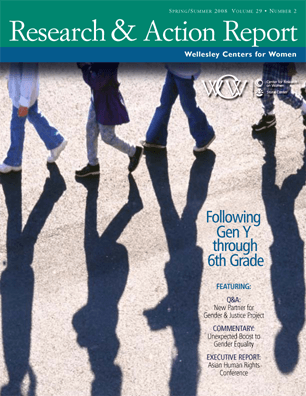Erika Kates, who recently joined the Wellesley Centers for Women (WCW) as a senior research scientist, previously served as research director at the Center for Women in Politics and Public Policy at the University of Massachusetts Boston. Her fields of most extensive experience include women in prison and the effect on women of the intersecting policies of welfare, workforce development, and higher education. She has published extensively, especially on the latter subject. The Educational Development Center recently included her in a book featuring 20 people who have made significant contributions to gender equity in education.
UNICEF and the Wellesley Centers for Women (WCW) convened a seminal Asian regional conference, Women and Children: the Human Rights Relationship, December 9-10, 2007 in Bangkok, Thailand. This conference was conceptualized by UNICEF’s Global Policy Section as part of a major initiative on human rights-based approaches to women’s and children’s rights. Rangita de Silva-de Alwis, senior advisor for international programs at WCW, led the organizing of this innovative and dynamic conference that had as its aims and goals an exciting agenda for change on the intersections of women’s and children’s rights.
Researchers at the Wellesley Centers for Women (WCW), as part of the National Institute of Child Health and Human Development (NICHD) NICHD Study of Early Child Care and Youth Development (SECCYD), have followed more than 1,000 children born in 1991. These are the children known as Generation Y – those born of the Baby Boom between 1981-1995. Earlier reports on this study have focused on child care and children’s early development. But these babies are growing up! This article reviews what researchers have learned about the youths’ experiences through sixth grade.
One hot August afternoon in 1999, after the day’s cooking and cleaning were done, I asked some of the young women of Miraflores, a Dominican village I studied for my dissertation, to talk with me about how their lives had changed since so many of their friends and neighbors began migrating to the United States. Mirafloreños have been moving to Boston since the early 1970s, settling in and around the neighborhoods of Dorchester, Roxbury, and Jamaica Plain. By the mid-1990s, nearly three-quarters of its households had family members living in Massachusetts. Close to 60 percent received some monthly income support from migrants. It seemed to me that the exchanges of people, money, goods, and what I call social remittances or ideas, practices, social capital, and identities that circulate regularly between people who move and people who stay behind had dramatically transformed aspects of daily life. In particular, I wanted to know how women’s lives had changed.

In this issue:
 | Wellesley Centers for Women 781.283.2500 |
Copyright © 2026 Wellesley Centers for Women, Wellesley College | Privacy Policy
